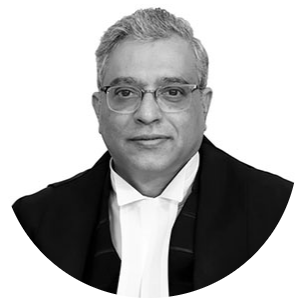Profile
Early Life
Justice Pamidighantam Sri Narasimha was born on 3 May 1963 in Hyderabad. His father Justice Kodanda Ramayya was a judge of the Andhra Pradesh High Court between 1982 to 1998.
He graduated with triple majors in Economics, Political Science, and Public Administration from Nizam College, Hyderabad. He finished his law degree at the Campus Law Centre, Delhi University in 1988 and subsequently started practicing law in Andhra Pradesh.
Career as an Advocate
Justice Narasimha began his legal practice at the High Court, Civil Courts, and Tribunals in Hyderabad. Later, he shifted his practice to the Supreme Court. Throughout his career, he appeared in several Constitution Bench cases of the Supreme Court. Notably, he served as the commission counsel for the Justice Chinnappa Reddy Commission, which identified classes of persons to be identified as Backward Classes (OBCs). He was also a member of the Supreme Court Legal Aid Committee.
In 2008, he was designated as a Senior Advocate by the Supreme Court. He appeared in several high-profile cases as a Senior Advocate. In the Ayodhya Title Dispute case he argued that the Hindu community had continuously believed that the disputed site in question was Lord Ram’s birthplace even before the construction of the Babri Masjid.
He also served as the amicus curiae for the Forest Bench and various cases concerning Judicial Appointments, Fast Track courts, and Tribal laws.
In May 2014, he was appointed as the Additional Solicitor General of India. As the ASG, he assisted the Court in the National Judicial Appointment Commission case for recruitment and appointment of judges. The NJAC was, however, struck down.
He also appeared before the International Tribunal for the Law of the Sea (ITLOS) in Hamburg, Germany, and the Permanent Court of Arbitration (PCA) in The Hague for Investment Treaty Arbitration. Additionally, he presented a paper on extradition and the environment during the Indian Supreme Court Delegation’s visit to the Canadian Supreme Court.
He was a part of the Governing Body of the National Legal Services Authority of India (NALSA) and was closely associated with the Mediation and Conciliation Project Committee (MCPC) of the Supreme Court. NALSA is an organisation created under the Legal Services Authorities Act, 1987 and provides free legal help to the disadvantaged sections of the population. He was involved in the development of laws related to Mediation and arbitration and served as a Mediator in the BCCI case. He also participated in committees focused on restructuring Appellate Tribunals, reviewing Corporate Social Responsibility laws, and served as a member of the Investor Education and Protection Fund Authority (IEPFA).
He was also one of the advocates who appeared for the state of Punjab in litigation involving stubble-burning by farmers, which was the source of air pollution in Delhi. Justice Narasimha had argued that the state had taken measures to check its air emissions, noting that the state had eight nodal officers to check house fires.
During the COVID-19 pandemic, advocates of the Supreme Court raised ₹ 5 crores as financial relief for lawyers across the country who were facing financial difficulties due to cessation of in-person court proceedings. Justice Narasimha had made a major contribution of ₹ 15 lakhs.
Career as a Judge
On 31 August 2021, Justice Narasimha was elevated as a Judge of the Supreme Court directly from the Bar. As per the seniority rule, he will become the Chief Justice of India in October 2027. He will be the third person appointed directly from the bar to serve as Chief Justice, joining the ranks of S.M. Sikri and U.U. Lalit.
Notable judgements
In 2023, Justice Narasimha was a part of the bench that heard Supriyo @ Supriya Chakraborty & Anr. v Union of India. In a unanimous decision, the Court did not recognise a ‘right to marry’ as a fundamental right and decided not to interpret the Special Marriage Act, 1954 to include sexual minorities. Justice Narasimham in his separate concurring opinion, stated that marriage was governed by customary practices and religious beliefs often found in personal law. He wrote that the petitioners wanted to place “positive legislative obligations on the State, and therefore, cannot be acceded to.”
In Sita Soren v Union of India (2024), Justice Narasimha was a part of the seven-judge bench which unanimously held that lawmakers would not be immune from bribery charges, and would lose the protection they received from Articles 105(2) and 194(2). The judgement overturned the five-judge bench decision in P.V. Narasimha Rao v State (CBI/SPE) (1998), which held that lawmakers enjoy such immunity.
In Government of NCT of Delhi v Union of India (2023), Justice Narasimha was a part of a five-judge bench that held that the control over administration and services in Delhi vests in the hands of the elected Delhi government and not the Union. The Bench emphasised the importance of a federal structure of governance where civil servants, through a ‘chain of accountability’, must be held responsible to the electorate.

